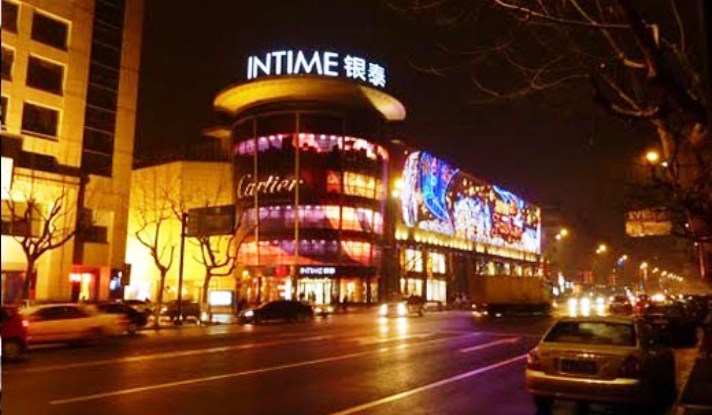
(This story has been updated to include an estimate of the total value of the offer)
Alibaba Group has offered toprivatize Intime Retail, a leading China department store and mall operator, a deal the e-commerce giant says will help pave the way for the digital transformation of old-school retailing.
The proposal, announced Monday, calls for an Alibaba subsidiary to team up with an entity wholly owned by Intime Retail founder Shen Guo Jun to buy out Intime shareholders and take the Hong Kong stock exchange listed company private. Under the proposal, thebuyers will pay HK$10 per share for Intime stock, a 42 percent premium over the closing price of HK$7.03 on Dec. 28, 2016, before trading of Intime shares was suspended.
Alibaba currently owns 28 percentof Intime following an initial investment in the retailer in 2014. If shareholders approve the deal, Alibaba would become the controlling shareholder of Intime with an expected stake of approximately 74 percent. Alibaba estimated the maximum amount of cash required to complete the deal at approximately HK$19.8 billion ($2.6 billion).
The Intime bid is Alibaba’s latest move to integrate its vast e-commerce assets and ecosystem with brick-and-mortar retailers, part of the company’s vision to merge online and offline shopping into an “omni-channel” consumer experience centered around mobile-internet technologies.
“Our combination with Intime will enable us to tap into the long-term growth potential of a new form of retail in China powered by internet technology and data,” said Alibaba Group CEO Daniel Zhang in a statement. Intime operates 29 department stores and 17 shopping malls, mainly in first- and second-tier cities, and has a strong presence in Zhejiang Province where Alibaba is headquartered.
Chinese consumers increasingly use their mobile phones to shop, a trend that Alibaba says can help conventional retailers create a new shopping paradigm while improving operating efficiency. As of the quarter ended September 2016, 78% of the gross merchandise volume on Alibaba’s China retail marketplaces was generated from mobile, and mobile monthly active users reached 450 million in September, the company said.
The move to mobile has opened up opportunities for brick-and-mortar retailers to improve the shopping experience by, for example, allowing customers to pay electronically at cash registers, enjoy targeted e-promotions while shopping in stores, and buy merchandise online but pick up orders in physical shopsif they don’twant to wait for delivery. During Alibaba’s giant 11.11 Global Shopping Festival in November, the company launched a Pokeman Go-like augmented-reality mobile game to drive traffic to real-world retailers including Intime shopping malls.
Greater digital integration also means merchants can improve inventory management, boost turnover and get better information on their customers by merging online and offline customer data, according to Alibaba.
Alibaba’s bid for Intime comes at a time when traditional retailers, and particularly department stores, are under pressure around the world due to shifting consumer behavior andthe loss of market share to online merchants.In China, online shopping in 2016 represented 18.4 percent of the country’s total retail sales, a proportion that is expected toincrease to 34 percent in 2020, according to market research firm eMarketer.
“We don’t divide the world into real or virtual economies, only the old and the new,” Zhang said. “Those who cling on to the old ways of retailing will be disrupted, and brick-and-mortar businesses will be able to create value for consumers if they are integrated with the power of mobile reach, real-time consumer insights, and technology capability to improve operating efficiency.”
Zhang elaborated on this strategy in an Oct. 13 letter to Alibaba shareholders, writing that “From our perspective, the most important opportunity on the horizon is not growing online sales in isolation but rather helping traditional retailers upgrade into a brand new retail model.”
In a press release, Alibaba estimated the maximum amount of cash required for the deal is expected to be about HK$19.8 billion ($2.6 billion).




